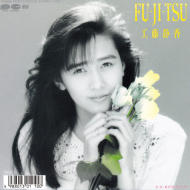
"Fu-ji-tsu" is a song recorded by Japanese singer Shizuka Kudo for her eponymous second studio album, Shizuka. It was released on June 1, 1988 through Pony Canyon as the album's leading single. The song was written by Miyuki Nakajima and composed and produced by Tsugutoshi Gotō. This collaboration with a respected singer-songwriter like Nakajima, as well as Kudo's overall shift in image, were seen as a catalyst for the end of the 1980s idol phenomenon, with Kudo's career path being regarded as the blueprint for the successful transition from idol to artist.
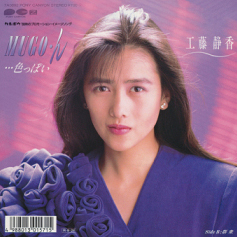
"Mugon... Iroppoi" is a song recorded by Japanese singer Shizuka Kudo. It was released as a single by Pony Canyon on August 24, 1988. It was used in the Kanebo Cosmetics televised ad campaign of fall 1988, for which the catchphrase was "n... Iroppoi". Kudo made her first appearance on the 39th Kōhaku Uta Gassen and performed "Mugon... Iroppoi" for the Red team. The song was nominated for the Grand Prix at the 30th Japan Record Awards.
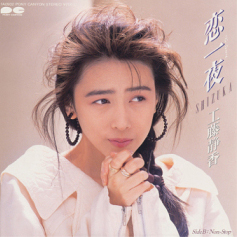
"Koi Hitoyo" is a song recorded by Japanese singer Shizuka Kudo, released on December 28, 1988, by Pony Canyon as the lead single from her third studio album Joy (1989). Almost a year later to the day, Kudo marked her second appearance on Kōhaku Uta Gassen by performing "Koi Hitoyo".

"Arashi no Sugao" is a song recorded by Japanese singer Shizuka Kudo, released as a single by Pony Canyon on May 3, 1989. Although the song is one of Kudo's most recognizable hits, as well as widely considered to be her breakout hit, and despite the fact that it was included on the compilation album Harvest, released later that same year, it was never featured on any of Kudo's studio albums. At the fourth Japan Gold Disc Awards, "Arashi no Sugao" was one of the five recipients of the award for Best Single of the Year. In 2015, DAM asked their users to select their favorite Shizuka Kudo songs to sing karaoke to and compiled a top ten list; "Arashi no Sugao" was ranked number seven.

"Kuchibiru Kara Biyaku" is a song recorded by Japanese singer Shizuka Kudo for her fifth studio album, Rosette. It was released by Pony Canyon as the album's lead single on January 10, 1990. Although it was not officially released on vinyl, a few copies were produced for promotional use. Kudo performed the song on the 41st Kōhaku Uta Gassen, marking her third appearance on the program. In 2015, DAM asked their users to select their favorite Shizuka Kudo songs to sing karaoke to and compiled a top ten list; "Kuchibiru Kara Biyaku" came in at number six.
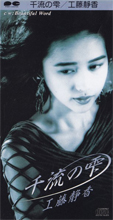
"Senryū no Shizuku" is a song recorded by Japanese singer Shizuka Kudo. It was released as a single through Pony Canyon on May 9, 1990. It marks the debut of Kudo as a songwriter. The song was featured on commercials for Taiyo Yuden That's cassette tapes. Similarly to her previous single, "Kuchibiru Kara Biyaku", a limited number of 7-inch vinyls of the single were produced for promotional use. "Senryū no Shizuku" has never appeared on an original album, but was included in the compilation album Unlimited (1990).

"Please" is a song recorded by Japanese singer Shizuka Kudo. It was originally intended to be included on Kudo's sixth studio album, Mind Universe, but was dropped at the last minute. The song was released as a single by Pony Canyon shortly thereafter on May 15, 1991. It made its first album appearance on the compilation album Intimate.
"Metamorphose" is a song recorded by Japanese singer Shizuka Kudo. It is the theme song for the CX television series Nandara Mandara, which starred Kudo herself. It was released as a single through Pony Canyon on October 23, 1991. "Metamorphose" made its first album appearance on the compilation album, Intimate. Kudo performed the song on her fourth appearance on Kōhaku Uta Gassen. In 2015, DAM asked their users to select their favorite Shizuka Kudo songs to sing karaoke to and compiled a top ten list; "Metamorphose" was one of the top vote-getters, rounding up the list at number ten.

"Mechakucha ni Naite Shimaitai" is a song recorded by Japanese singer Shizuka Kudo, from her seventh studio album, Trinity. It was released through Pony Canyon as the album's lead single on January 29, 1992. Kudo performed the song on the 43rd Kōhaku Uta Gassen, marking her fifth consecutive appearance on the annual show. In 2007, Kudo recorded a self-cover of the song with a jazz arrangement for the compilation album Shizuka Kudo 20th Anniversary the Best, released in commemoration of her 20th anniversary.

"Urahara" is a song recorded by Japanese singer Shizuka Kudo. It was released as a single by Pony Canyon on May 21, 1992. The song made its first album appearance on the compilation album, Super Best.

"Koe o Kikasete" is a song recorded by Japanese singer Shizuka Kudo. It was released as a single through Pony Canyon on August 21, 1992. The song was featured on the AX television series Kyōshi Natsuyasumi Monogatari. It made its first album appearance on the compilation album, Best of Ballade: Empathy, released later that same year.
"Dōkoku" is a song recorded by Japanese singer Shizuka Kudo for her eighth studio album, Rise Me. It was released by Pony Canyon as the album's lead single on February 3, 1993. "Dōkoku" is the theme song of the CX getsuku television series Ano Hi ni Kaeritai, starring Momoko Kikuchi and Kudo herself as two sisters who fall in love with the same man. Kudo performed the song on the 44th Kōhaku Uta Gassen, marking her sixth consecutive appearance on the annual show. With over a million copies sold, "Dōkoku" remains Kudo's best-selling single to date. In 2015, DAM asked their users to select their favorite Shizuka Kudo songs to sing karaoke to and compiled a top ten list; "Dōkoku" came in at number two.

"Watashi wa Knife" is a song recorded by Japanese singer Shizuka Kudo. It was released as a single through Pony Canyon on June 2, 1993. It made its first album appearance on the compilation album, Super Best, released later that same year.
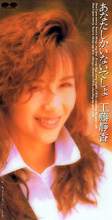
"Anata Shika Inai Desho" is a song recorded by Japanese singer Shizuka Kudo. It was released as a single through Pony Canyon on October 6, 1993. It made its first album appearance on the compilation album, Super Best, released later that same year.

"Blue Rose" is a song recorded by Japanese singer Shizuka Kudo, from her ninth studio album, Expose. It was released through Pony Canyon as the album's lead single on March 18, 1994. The song marks a significant change in artistic direction for Kudo, as it is her first single to be self-produced, as well as her first release since parting ways with long-time collaborator Tsugutoshi Gotō, who has helmed Kudo's songwriting team since her solo debut. It was featured on TV commercials for Seagaia Ocean Dome. The single's B-side, "Door", is the ending theme to the TX television series Tsumiki Kuzushi: Hōkai, Soshite.... Kudo performed "Blue Rose" on the 45th Kōhaku Uta Gassen, marking her seventh consecutive appearance on the show. It is the first in a trilogy of singles with the word "blue" in the title: "Blue Rose" was later followed by "Blue Velvet" and "Blue Zone".

"Jaguar Line" is a song recorded by Japanese singer Shizuka Kudo, from her ninth studio album, Expose. It was released through Pony Canyon as the album's second and final single on July 21, 1994.

Shizuka Kudo 20th Anniversary the Best is the eleventh compilation album by Japanese singer Shizuka Kudo. It was released in celebration of Kudo's 20th anniversary since her solo debut on August 29, 2007, through Pony Canyon. The compilation includes a selection of Kudo's singles released up until "Amayo no Tsuki ni". The limited edition comes with a DVD featuring the music videos for "Lotus ", "Kokoro no Chikara", "Clāvis (Kagi)" and "Amayo no Tsuki ni", as well as a digest of Kudo's live performances. Shizuka Kudo 20th Anniversary the Best was the first of three releases to celebrate Kudo's 20th, it was followed by the video album box set Shizuka Kudo The Live DVD Complete Box in September 2007, and the B-side compilation, "20th Anniversary B-side collection" in 2008.

Euro Shizuka Kudo is the first and only remix album by Japanese singer Shizuka Kudo. It was released on September 20, 2000, through Pony Canyon. The EP features four of Kudo's hit songs remixed into Para Para-ready Eurobeat numbers. It was released as part of the Euro series by Pony Canyon, which only includes one other release, the EP Euro Onyanko, which gives the Eurobeat treatment to four songs by Onyanko Club. The EP was released after Kudo left Pony Canyon and moved to Extasy Japan and is not considered an official release on her side.

Millennium Best is the ninth compilation album by Japanese singer Shizuka Kudo. It was released on March 15, 2000, through Pony Canyon. It is Kudo's second single collection: the album features all of Kudo's singles released from "Kindan no Telepathy" (1987) up to her most recent at the time, "Blue Zone" (1999), as well as all five singles released by Ushirogami Hikaretai. The album was released digitally on May 28, 2014, however only the four singles missing from the subsequently released compilation Shizuka Kudo Best were made available for download.

Rise Me is the eighth studio album by Japanese singer Shizuka Kudo. It was released on April 1, 1993, through Pony Canyon. Rise Me is Kudo's last album to be produced by Tsugutoshi Gotō. It yielded Kudo's best-selling single, "Dōkoku".


















